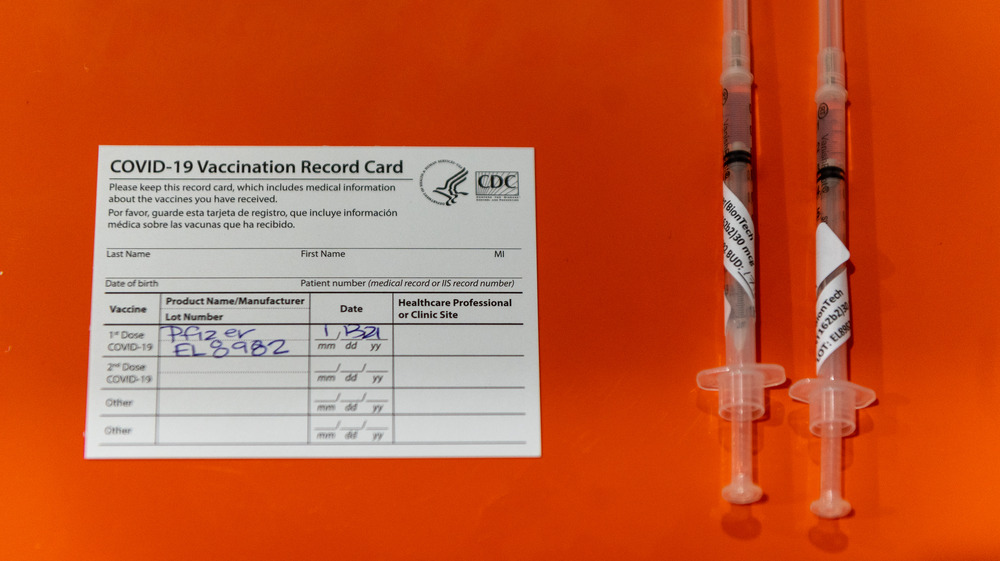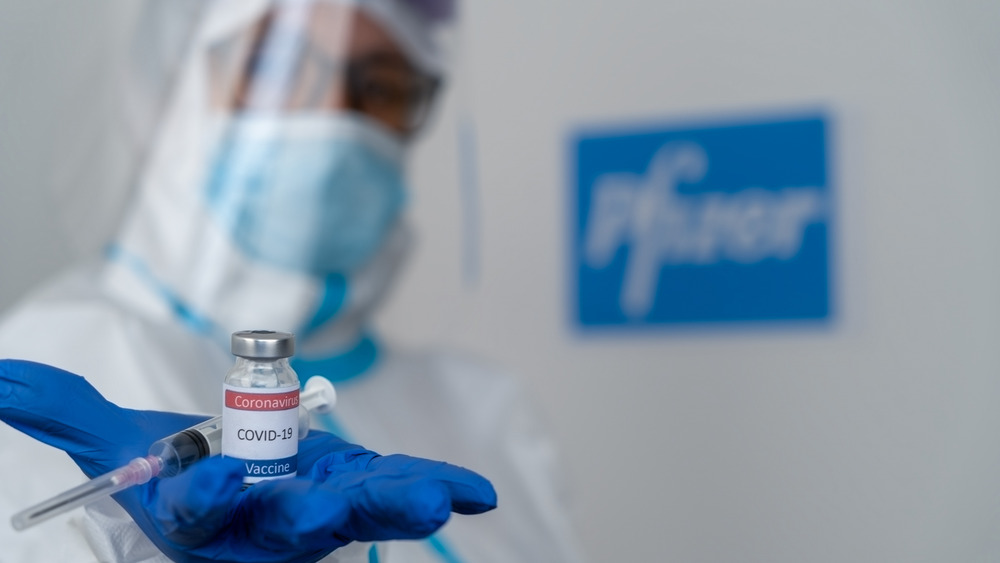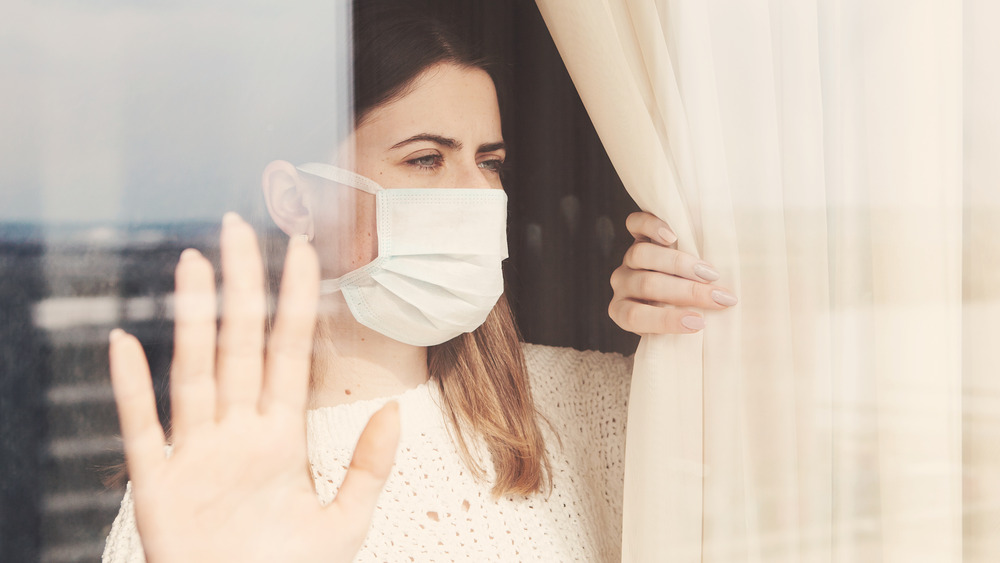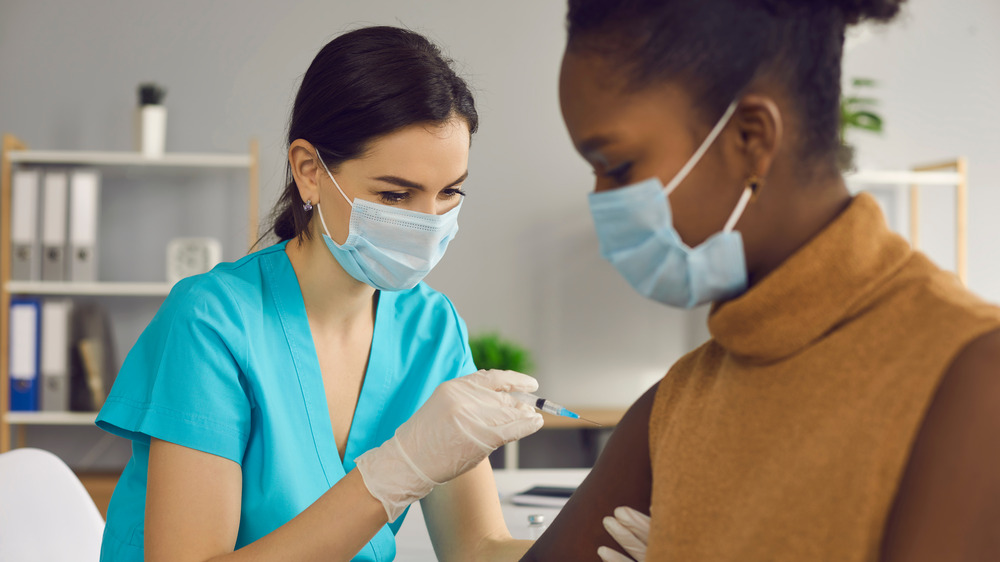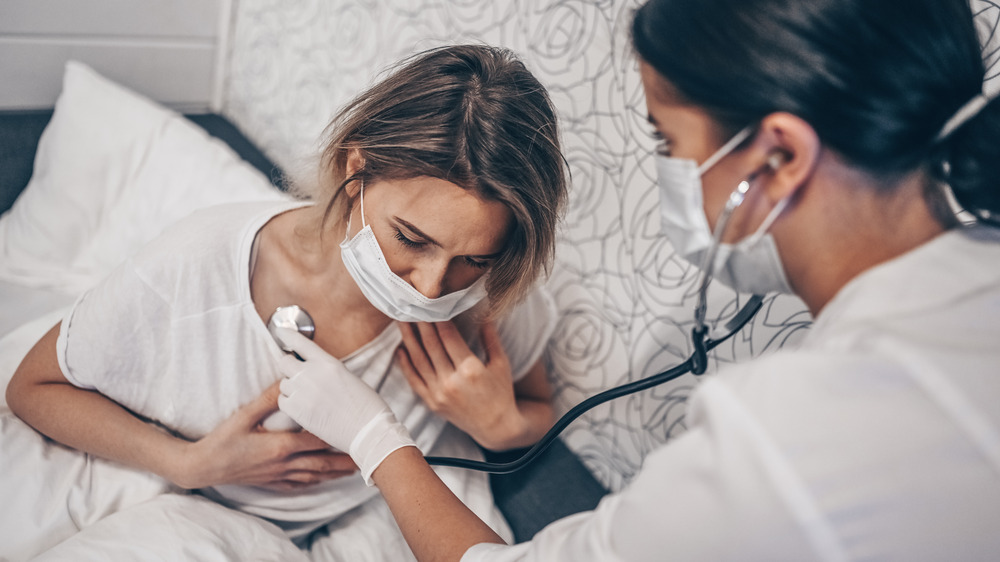When You Get Pfizer's COVID-19 Vaccine, This Is What Happens To You
At the start of 2021, three different versions of the COVID-19 vaccine were rapidly rolled out to citizens across the country in an effort to quickly and effectively contain the ongoing spread of the Coronavirus. Pfizer, Moderna, and Johnson & Johnson received emergency authorization by the U.S. Food & Drug Administration (FDA) for their developed vaccines to be administered to those sixteen years and older.
Based on a wide range of information relayed through various media outlets, many people have found themselves thinking about which vaccine they would feel most comfortable receiving. Based on concerns around side effects or vaccine makeup, many individuals have found themselves developing a personal preference for one over the other. Because the Centers for Disease Control and Prevention (CDC) encourages people to accept whichever brand of the vaccine is most readily available, familiarizing yourself with some basic facts regarding one of the most widely administered brands of the vaccine, the Pfizer-BioNTech COVID-19 vaccine, may help answer any questions you may have.
What is the Pfizer vaccine made of and how does it work?
While the Johnson & Johnson vaccine is comprised of virus-based components, the Pfizer and Moderna vaccines use a different approach (via VCU Health). Classified as a messenger RNA (mRNA) vaccine, the Pfizer vaccine utilizes both chemical ingredients as well as naturally occurring compounds within its makeup. The following is a list of the active ingredients in the vaccine that Pfizer representatives have listed on their website: "potassium chloride, monobasic potassium, phosphate, sodium chloride, dibasic sodium phosphate dihydrate, and sucrose, as well as small amounts of other ingredients."
The Pfizer vaccine requires two separate doses to be administered in shot form in order to be most effective (via the FDA). With the second dose given three weeks from the date of the initial dose, the vaccine is disseminated into the arm muscle. It then goes to work through an intricate communication system with the body. As a messenger RNA vaccine, the keyword here is "messenger." The components within the vaccine trigger the body's immune system into identifying and fighting off the COVID-19 virus.
What is the purpose of the Pfizer vaccine?
According to the CDC's daily data tracker updated every evening at 8pm ET, as of April 8, 2021, there have been 30,737,477 cases of COVID-19 reported in the U.S. with a current total of 556,106 deaths. In an effort to eliminate more severe outcomes of the virus such as death and hospitalization, the vaccine plays an important role in safety and prevention. And The Advisory Committee on Immunization Practices says the efficiency of the Pfizer vaccine produced consistent results. Clinical trial reports stated, "Consistent high efficacy (≥92%) was observed across age, sex, race, and ethnicity categories and among persons with underlying medical conditions. Efficacy was similarly high in a secondary analysis including participants both with or without evidence of previous SARS-CoV-2 infection."
COVID-19 vaccination is important in order to prevent the development of additional outbreaks of the virus. Additionally, experts at the University of Maryland believe that the currently available vaccines may safeguard against the spread of new strains of the COVID-19 virus, some of which could have the potential to be more dangerous than the original strain.
Side effects of the Pfizer vaccine
Experiencing side effects after either the first or second dose of the Pfizer vaccine is not uncommon. The good news? During clinical trials, the CDC found most outcomes were relatively minor. The most common side effects were felt near the injection site, usually in the form of redness, swelling, or soreness (via the CDC). Additional side effects may also be experienced including but not limited to headache, fever, nausea, muscle aches, or chills. Most side effects usually appear within 24 to 48 hours of having received the first or second dose. While experts emphasize that these side effects will likely subside within a few days time, the more moderate side effects such as fever and chills, were found to be more commonly experienced after the second dose.
For those who have previously contracted the Coronavirus, some studies indicate that the intensity of the side effects after the shot may be more so than for those who have never been infected (via The New York Times). Therefore, if you've previously been diagnosed with COVID-19, you may temporarily experience more severe or uncomfortable reactions most likely to develop after receiving the first dose of the vaccine.
Concerns about allergic reactions and when to hold off on receiving the Pfizer vaccine
While the safety of the Pfizer vaccine has been carefully researched and monitored, there are some potential risks that can result from vaccination in terms of allergic reactions (via the CDC). In addition to the monitoring efforts being implemented by medical professionals at many vaccination sites, experts advise individuals to be vigilant about their own monitoring of any immediate adverse reactions to the injection. When it comes to immediate reactions, these adverse effects may include hives, swelling, or difficulty breathing generally within four hours of receiving a dose. More critical reactions may require hospitalization or the use of an EpiPen. If you have a history of these reactions following any previous vaccines, a known allergy, or you develop these symptoms after receiving the initial dose, disease experts advise against receiving any of the mRNA-based COVID-19 vaccines, like Pfizer's, and that you talk to your healthcare provider to discuss other options, especially if you've already received one dose.
What to do after receiving the Pfizer vaccine
Immediately after receiving the vaccine, as well as in the days following, it's important to continue to monitor your health. While side effects may emerge, it is also not uncommon to experience no reaction at all. When it comes to the Pfizer vaccine, The New York Times reported, "In the Pfizer vaccine trials, about one out of four patients reported no side effects." However, should side effects emerge, there are some steps you can take to alleviate the severity of the reaction if needed. Taking Tylenol can help manage physical distress but experts caution that doing so could have the potential to lessen the potency of the body's immune system response to the vaccine. This is particularly true if you're thinking of taking a pain reliever prior to receiving a dose in anticipation of potential side effects, as medical professionals generally advise against this. However, doing so before or after the fact will not completely cancel out the efficiency of the vaccine as the strength of our body's immune system is capable enough to still provide COVID-19 protection. Overall, if you feel you can endure without the help of a pain reliever, it may be best to refrain from usage.
The importance of keeping vaccination records safe and secure
Additionally, you will want to keep a record of your vaccination doses by safely holding on to the vaccination card provided to you at your vaccination site as it contains important information about the location, date, and type of vaccine administered. Consider safekeeping through the use of a protective pouch as laminating your card may make it difficult for medical professionals to add a record of any additional doses received including potential booster shots that experts say may possibly be required in the future (via NBC Chicago). Consider taking additional precautions by making both physical and digital copies of the card in the event that the original should get lost.
The COVID-19 vaccine will help end the Coronavirus pandemic. While all three vaccines have proven effective in prevention against COVID-19-related hospitalization and death, knowing the facts beforehand may help alleviate any vaccine related stress or worry.

